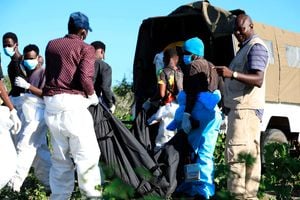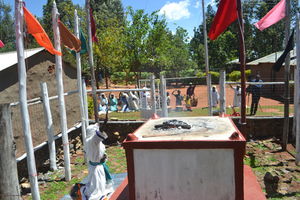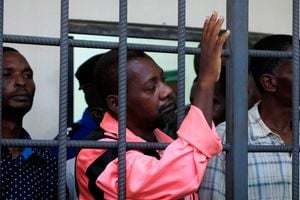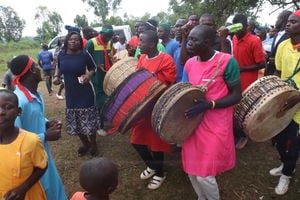
One of the key things that identify a cult is an over-emphasis on a certain doctrine.
Zakayo Avonde has not seen his sister, Rose Kakai, for more than a year now.
Mr Avonde’s family is convinced that she is one of the people who died in Shakahola, Kilifi County, after a deadly fast.
They plan to bury a banana stalk at their home in Lurambi, Kakamega County, and consider Rose dead.
When news broke out that bodies of faithful at the Good News International Church were being dug out of shallow graves in Shakahola, Mr Avonde travelled there hoping to locate Rose, who was by then unreachable on the phone.
“The government was bringing out people in stretchers. I didn’t see (my sister),” he says. “I even went to those who came out alive. I did not see her.”
She had left with a stash of cash, which Mr Avonde puts at Sh500,000, and said she was going to buy land from Pastor Paul Mackenzie, the leader of the church who is currently facing trial for deaths that happened at Shakahola.

Mr Zakayo Avonde, a resident of Kakamega County whose sister is feared to have died in Shakahola.
He adds that she jealously saved up that amount from the business she did.
“While here at home, she couldn’t buy anything, and she kept saying she had no money,” says Mr Avonde.
“I am sure my sister is dead. Had she been alive, she would have come home, now a year later. She could have heard this on the radio and TV then showed up. As it stands, we don’t think she is alive,” he adds.
Mr Avonde says Rose was childless, and this might have made her seek spiritual intervention. It is in that bid to have a higher power open her womb, he believes, that she encountered the preachings of Pastor Mackenzie.
“She told me that she first encountered Mackenzie on TV then became a follower,” he says.
This month marks a year since the beginning of the chain of events (March 15, 2023) that led to the discovery of mass deaths at Shakahola. The spark was ignited by a Mombasa-based teacher who reported three of his kin missing.
The number of bodies found at different locations at Shakahola currently stands at 429.
The Senate, in a committee report it adopted in November 2023, said it had all “reasonable cause to believe that Mackenzie contributed or caused directly or indirectly, the deaths of over 429 people.”
Mr Avonde has all reasons to believe his sister is among the statistics.
“We plan to dig up a grave and bury a banana stalk,” he says.
“The last time we spoke, in December (2022), she told me Mackenzie had given her a plot and she was constructing a house.”
The aspect of going to buy a house was mentioned by many who headed to Malindi for the same mission as Rose’s. The Senate report recorded many such accounts.
It concluded that Mackenzie “manipulated his followers by promising them land and financially exploited them by requiring them to sell their assets and hand over the proceeds to him.”
“As part of concealing the mass graves where his followers had been buried, Mackenzie planted vegetables on the graves,” said the Senate.
“(He) spread anti-government rhetoric and opposed government policy amongst his followers including preaching against deworming, national census and Huduma Namba which he called ‘the mark of the beast’,” it added.
It further stated: “After his arrest, without any iota of remorse and in full knowledge of the impact of his heinous acts, further intimidated the public in his now infamous brazen remark, ‘kitawaramba’, loosely translated to mean ‘it will catch up with you.’”
The Senate also noted that Mackenzie’s followers faced a slow and painful death through starvation while he “and his gang of violent enforcers enjoyed elaborate meals as evidenced by menus and cooking apparatus found at his house in Shakahola Forest”.
The Senate’s characterisation of Mackenzie’s church makes it align with some of the common characteristics of cults.
According to Dr Kevin Muriithi, the head of the Department of Practical Theology at St Paul’s University, four key things identify a cult.
“One of them is what we would call an over-emphasis on a certain doctrine,” says Dr Muriithi.

Kevin Muriithi, Head of Department for Practical Theology in the School of Theology at St Paul’s University.
“What is very evident in cults is that they would tend to over-emphasise, for example, that the world is ending and that this group will provide some solution or safety to the groupings or to the people who are joining this cult.”
The reverend, who is an affiliated post-doctoral Research Fellow at Stellenbosch University, adds that another aspect of cults is isolation.
“They tend to have these characteristics of withdrawing away from public life, sometimes from families,” says Dr Muriithi.
On that aspect of isolation, the Senate noted: “(Mackenzie) intentionally isolated his followers by moving into Shakahola Forest which is a remote inaccessible area, with no access to social services and caused his followers to cut links with family members, thus leaving them dependent and without protection.”
The third sign of a cult, Dr Muriithi says, is that there is usually a leader with charismatic authority.
“The people in this group would elevate this leader beyond any scrutiny or level of accountability. In other words, the word of this man or woman is final,” he says.
Most cults recorded in history have known leaders. They include Jim Jones, who ordered his followers to commit a “revolutionary act” by killing themselves through drinking a cyanide-laced juice in the US in 1977.
Read: Deadliest cult disasters
Then there is Marshall Applewhite, an American who led 38 others to a mass suicide in 1997.
The other characteristic of cults, Dr Muriithi says, is rejection of what other people consider public good.
“(There is) a withdrawal from daily activities and things like education. You find that people in some cultic groups say there’s no need of education,” he says.
“They would withdraw from things that we as ordinary Kenyans would value as important, like going to hospital or getting a good education.”
In Dr Muriithi’s view, it is critical for preachers to undergo training — either formally or non-formally.
“We go to the hospital right because we entrust our bodies to people who hawabahatishi (don’t engage in guesswork),” he says.
“We want people who are skilled in how they are leading and guiding us. When we go to the hospital, we want a doctor who is well-equipped. So must it be the case when we entrust our lives to our religious and spiritual leaders.”
Mr Avonde recalls some of the weird habits his sister developed before she went to Shakahola.
Self-regulation code
“One time I saw her burning her clothes and her photos. I asked her why, and her answer was that those were devilish. ‘And why are you burning your ID?’ I asked. She said, ‘These are devilish.’ I told her, ‘My sister, you’re not in your right senses.’
She would say we were looking down upon her; that she was now going to a place where no one would despise her,” he says.
Rev Tom Otieno, a priest with the Anglican Church of Kenya, is passionate about a self-regulation code of conduct that some churches have been signing since last year.
“We have come up with a document that regulates governance. We have also come up with documents that regulate the code of conduct,” he says.
“But I have to say that this is not binding to all churches in the country because it is a ‘willing buyer willing seller’ sort of agreement,” adds the priest who is stationed at St Augustine’s parish in Makadara, Nairobi.
He notes that not all churches have welcomed it.

Rev Tom Otieno, a priest with the Anglican Church of Kenya.
“That document should have been ratified earlier. It was just ratified towards the end of last year. That’s when we actually managed to get all those who subscribe, and they were many,” he says.
He adds: “And, like I said, it was the biggest group of church leaders to ratify a document. Those are ordinarily people you won’t have a problem with. They control most of the religious groupings in the country. So, the issue will come with little sects that have large followings.”
“There are churches that may not be willing to be bound by such kind of accountability structures. That really is usually the weak link that the church has, because there are leaders who will not bind themselves to that, and they become very slippery and very difficult to handle,” he adds.
In Rev Otieno’s view, Shakahola shone the Church in a bad light.
“The conversation on Shakahola really ought to begin with an apology from the Church that this happened under our watch. Whatever other mitigations can be said about Shakahola, I think we must have the stomach to take responsibility and say something nasty happened under our watch.
"So, on behalf of the church, let me say I’m terribly sorry for what happened and what continues to be unearthed. It’s very, very sad. Very unfortunate,” he says.
The Senate issued a raft of recommendations on how to deal with the Shakahola matter. It had been informed by one expert that one way in which cults sprout is by using mass media.
To arrest that, the Senate asked the Director of Criminal Investigations to collaborate with the Communications Authority and conduct investigations to bring to book anyone involved in distributing Mackenzie’s teachings.
“(They should) recommend prosecution of any person or entity involved in the filming, production, dissemination or distribution of media content in any form and on any media platform that advances the doctrine of Mackenzie or his associates, Good News International Ministries and Good News Media Limited within 30 days of the adoption of this report by the Senate,” directed the House.
“The Communications Authority (should engage) YouTube, Facebook and other social media networks and sites that have content associated with Mackenzie and his teachings with a view to permanently delete such existing content and remove the accounts,” it added.
The Senate also recommended that the Good News International Ministries be declared a criminal organisation, which has since happened.
Noting that most of the survivors of the cultic activities had destroyed vital documents like IDs, title deeds, birth certificates and academic certificates “as a result of indoctrination”, the Senate also directed the Interior ministry to facilitate the regaining of their documents.
Additional reporting by Ngina Kirori











